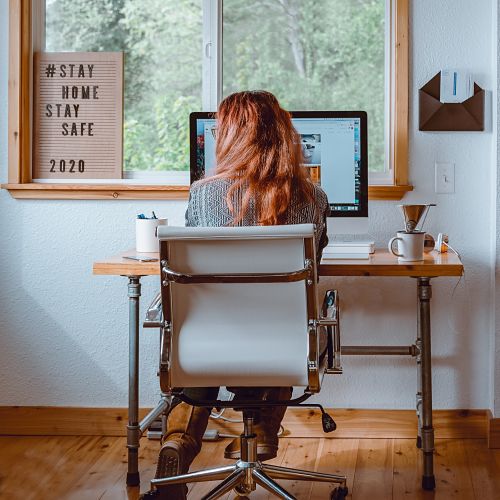In early 2020 when most of us first heard the word Coronavirus, little did we know the havoc this virus would create throughout the world. In just a few months the virus became a global pandemic and the UK was set to suffer huge casualties. With public health organisations and the UK Government both advising against public gatherings, the UK workforce quickly slipped into a ‘working-from-home’ lifestyle.
It’s estimated that at least 15-million people, which is half of the UK’s working population, now work remotely. And it’s not anticipated this situation will change any time soon. In fact, many believe the way we work is forever changed. A study at the end of 2021 found that three-quarters of people wanted to keep working from home, once the COVID pandemic was over.
Today, there are millions of makeshift and permanent home offices around the country.
The two main challenges associated with working from home are managing productivity and managing noise and distractions. While many people were initially excited at the idea of getting away from the office and water cooler chatter, they soon discovered that working from home presented another set of challenges – noise and other distractions. There’s no doubt that productivity can be adversely affected by distractions like barking dogs, noisy children, nearby constructions, and so on.
Creating the perfect home working environment and maintaining a positive attitude can change working at home from a negative experience to a positive and productive experience. So let’s work on resolving the negative aspects of working from home.
Your At-Home Workspace Must Be a Dedicated Work Area
Those people fortunate enough to have a spare room available in their home have probably already converted this space into an office. When interrupted by the everyday busyness of other family members, they can easily close the door to block out noise.
Those who don’t have the luxury of a spare room in their home, and who will be working in a communal space with others, will not only need to make creative use of whatever space they do have, they’ll also need to set some ground rules with other occupants of the home.
Perhaps there’s a hallway that can be set up as a workstation, or maybe they can claim the kitchen table once meals are over. Either way, the only way to develop new and successful work-at-home habits is to claim the space and use that space every day for the same purpose.
Setting ground rules is vitally important for controlling noise at home because the last thing you need is loud family members or housemates laughing and talking when you’re trying to concentrate or you’re on a business phone call.
Decrease Distractions by Eliminating Background Noise
Whether you work at home or in an office situation, it’s always been understood that background noise has a detrimental effect on both concentration and workplace productivity.
The British Journal of Psychology published a study whereby workers were required to perform maths and memory recall tasks. When workers were subjected to recordings of typical office noise, the accuracy of work reduced by a whopping 62%.
Subsequent studies have shown how office productivity is impacted when acoustical conditions improve. These studies were conducted in simulated open-office environments, but a home office could be subjected to as much, or even more noise. This is what they discovered –
- There was a decrease in conversational distractions by 51%.
- There was a 48% improvement in office workers’ abilities to focus on their tasks.
- There was a reduction in stress by 27%. This was measured in terms of actual physical stress symptoms.
- There was a 10% improvement, measured in terms of short-term memory and accuracy, in the execution of standard ‘information-worker’ tasks.
At-Home Office Work and Earplugs
We think most people will agree that our most valuable commodity in today’s modern business world is our attention span. There’s always something vying for our attention, whether it be television, digital devices, background noise, or conversations. From the moment we wake up our attention is up for grabs. Managing productivity is all about the ability to focus on the task at hand. When you’re working at home the number of distractions increase, which is why many work-at-home professionals have turned to wearing earplugs in their workspace.
At Zoom Health we are earplug experts. We are certain we can find the right earplug for you and will strive to do this. Earplugs for work need not be expensive. Our Women’s Earplugs Sample Pack and Men’s Earplug Sample Pack are two great collections of earplugs that we have put together, They are designed to allow you to find the perfect earplug for daily wear. Often, a standard earplugs, costing pennies, is all that you need. Or you can choose to use an earplug that has been specially designed for use in the office.
Earplugs For Use in Your At-Home Workspace

Haspro Office Universal Earplugs
Haspro Office Universal earplugs were designed for anyone requiring silence during long office hours. For those now working at home, these earplugs are just as helpful (if not more so) in blocking out noise in your home workspace.
These earplugs deliver maximum reduction of annoying and distracting noise. If you’re feeling distracted at work, your stress levels are high, and you feel exhausted after work, chances are the environment you’re working in is too noisy.
Haspro’s office earplugs have been designed with a special acoustic filter which eliminates noise and allows you to work uninterrupted. You’ll still hear audible alarms, like your phone ringing. The earplugs are super comfortable and can be worn for hours. Your ears will be ventilated via both the filter and soundproofing. Manufactured with a very discreet design, these earplugs are transparent and small, yet won’t fall out of your ear.
Plan a Work Schedule, Including Breaks
You’ll find that working from home allows for greater flexibility with your daily work schedule; however, it’s important that you try to keep to the same schedule. It’s the same as if you were working in an office environment. Most people like routine, so they know they’ll be working at their desk during certain hours and they’ll take breaks at certain hours. Your work-at-home schedule should be just the same.
Creating a dedicated workspace is crucial, but don’t forget to make it comfortable and inspiring. Add personal touches like plants, family photos, or motivational quotes. Consider ergonomics too – invest in a good chair and position your screen at eye level to avoid neck strain.
Why not try the Pomodoro Technique? Work in focused 25-minute bursts, followed by 5-minute breaks. It’s brilliant for maintaining concentration and productivity.
Remember, working from home doesn’t mean being chained to your desk. Take a quick stroll around the garden or do some stretches between tasks. Moving your body can refresh your mind and boost creativity.
And, if the weather’s great and you’re able to spend some time outside in the sunshine and fresh air, you’ll find you’ll be even more productive.
If you’re lacking in motivation, try creating daily and weekly to-do lists. Working at home is all about accountability, so because you’re not working in an office environment you’re 100% responsible for completing work tasks on time. It’s understandable that working from home and staying motivated can initially seem quite challenging, especially as there are so many distractions competing for your attention, but by creating and sticking to a regular schedule you should find that you’ll become a disciplined at-home worker in no time at all.
Finishing Your At-Home Work Day
One of the main challenges for people working from home is maintaining a healthy balance between their work life and their personal life, especially now that both of these require sharing the same physical space.
When it’s the end of your work day, people working from home must mentally clock out and change their mindset to being at home. Resist the urge to review that report or check your emails one last time. If you give in, the line between work and home will become so blurred that you’ll never stop working.
Working from home should be as close as possible to working in an office environment – when it’s time to stop working you pack up and go home. The same applies to working at home. And weekends are no different. All employees need time to recharge after a long day or long week at work, so unless it’s an emergency, your work should remain untouched until Monday morning.
Don’t Isolate Yourself from Other People
Working from home very quickly clarifies whether people are an introvert or extrovert. Introverts will welcome working alone from home, especially as it means there’ll be no interruptions from co-workers. On the other hand, working from home alone can be quite daunting for extroverts, or those more outgoing. Either way, working from home can be quite isolating, so it’s important that both introverts and extroverts make the effort to connect with other people during the day, preferably not about work matters. It only takes a five-minute phone call or a quick text to renew a connection with a friend or family member.
Working At Home Could Be Here To Stay!
Most people had no choice about whether they did – or did not – want to work from home, but it appears that the work-at-home trend is not going away anytime soon. In fact, it could become the norm for many, many workers.
Many people currently working from home state that they’re achieving high levels of productivity that equal and even surpass their productivity in an office situation. Some even state that they have adjusted so well to working at home that they’re not eager to return to their normal office arrangement.
In Conclusion
You can have the best of both worlds by working at home; however, you must find workable ways of managing productivity and managing noise and distractions. You must also create a workable schedule and stick to it.
Photo by Tina Witherspoon on Unsplash
Zoom Health is a leading UK supplier of Home Health Tests and Earplugs
This post was originally published in December 2020 and has been updated since.





